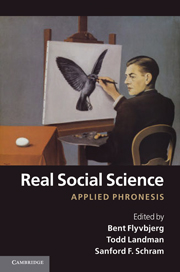Book contents
- Frontmatter
- Contents
- Figures
- Tables
- Contributors
- Acknowledgements
- 1 Introduction: new directions in social science
- Part I Theory and method
- 2 Phronetic social science: an idea whose time has come
- 3 Phronesis and narrative analysis
- 4 The feel for power games: everyday phronesis and social theory
- 5 Phronesis, projects and power research
- Part II Applied phronesis
- 6 Why mass media matter and how to work with them: phronesis and megaprojects
- 7 Power and conflict in collaborative research
- 8 Unsettling a settler society: film, phronesis and collaborative planning in small-town Canada
- 9 Phronesis and critical policy analysis: Heathrow's ‘third runway’ and the politics of sustainable aviation in the United Kingdom
- 10 Amnesty in the age of accountability: Brazil in comparative context
- 11 Feminist phronesis and technologies of citizenship
- 12 Making the teaching of social justice matter
- 13 Spatial phronesis: a case study in geosurveillance
- 14 Important next steps in phronetic social science
- Index
- References
11 - Feminist phronesis and technologies of citizenship
Published online by Cambridge University Press: 05 June 2012
- Frontmatter
- Contents
- Figures
- Tables
- Contributors
- Acknowledgements
- 1 Introduction: new directions in social science
- Part I Theory and method
- 2 Phronetic social science: an idea whose time has come
- 3 Phronesis and narrative analysis
- 4 The feel for power games: everyday phronesis and social theory
- 5 Phronesis, projects and power research
- Part II Applied phronesis
- 6 Why mass media matter and how to work with them: phronesis and megaprojects
- 7 Power and conflict in collaborative research
- 8 Unsettling a settler society: film, phronesis and collaborative planning in small-town Canada
- 9 Phronesis and critical policy analysis: Heathrow's ‘third runway’ and the politics of sustainable aviation in the United Kingdom
- 10 Amnesty in the age of accountability: Brazil in comparative context
- 11 Feminist phronesis and technologies of citizenship
- 12 Making the teaching of social justice matter
- 13 Spatial phronesis: a case study in geosurveillance
- 14 Important next steps in phronetic social science
- Index
- References
Summary
When I first read Bent Flyvbjerg's work, I was struck with a kind of profound gratitude. ‘Ah,’ I thought, ‘now here's something I can actually use.’ For those of us undertaking collaborative research with our neighbours or with social movements, phronesis can feel like a longed-for ally, a companion in a struggle that can sometimes feel isolating. The questions he raises are familiar to engaged academics trying to bridge analysis, social action and a commitment to scholarship for social change: how do we develop ‘wisdom that works’ in specific social contexts, while tackling complex global problems?; how do we create mechanisms for uncovering and validating collective, real-world knowledge?; how do we make informed and democratic decisions about critical issues in the face of contingency, dissent, difference and change? Phronesis is useful because it gives us permission to finally abandon the failed project of producing a social science focused on universal truth, broad generalizability, prediction and a stance of disinterested neutrality. Better yet, it challenges us to invent a better social science, one that connects research to practical reasoning and social action. I am inspired by the challenge levied by Making Social Science Matter (2001), and the wealth of thoughtful scholarship it has generated. Flyvbjerg's reinterpretation of phronesis opens up intellectual room in crowded disciplinary halls, providing vital public space to explore knowledge that matters.
One aspect of phronetic social science that has been underexplored, however, is its close links to feminist epistemology and sociology of knowledge. After getting over the initial pleasure of recognition, my next response to Flyvbjerg's work was puzzlement. I felt like I was standing between two beloved friends at a party, gaping, wondering, ‘how is it possible that the two of you haven't met?’ The resonances between phronetic social science and current feminist scholarship into how knowledge is created and legitimated are obvious, varied and powerful.
- Type
- Chapter
- Information
- Real Social ScienceApplied Phronesis, pp. 228 - 245Publisher: Cambridge University PressPrint publication year: 2012
References
- 8
- Cited by



